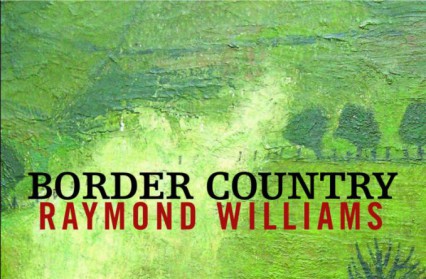Continuing in his journey through the Library of Wales, Jon Gower considers the contemporary fiction novel, Border Country by Raymond Williams.

It’s not often I reach for the calculator when reading fiction but as a break from reading Raymond Williams’ sublime Border Country, I’ve decided to see how much time this reading-my-way-through-The-Library-of-Wales caper is going to take me.
There are thirty-one volumes on the shelf next to my writing desk, handsome with their red, black and white spines. There are forbiddingly thick tomes such as the Lewis Jones double-header Cwmardy and We Live, chronicling the first thirty years of the twentieth century and much daintier books such as Brenda Chamberlain’s A Rope of Vines which is only a tendril thick.
In total there are 10,326 pages, so at 30 pages and hour that’s going to take me 344 hours or the equivalent to 43 full working days. Not that it feels like work, not when it’s a novel as absorbing and insistently lyrical as the one next to the bed. I could start speed-reading, but that would defeat the object.
I’ve decided I’ll re-read the books I have read before, which means there’s one book that I’m really not looking forward to reading (but you’ll have to wait until Number 20 in the series before I reach that one). Who knows: I may love it the second time around. Scarcely believe. But there are also those old friends to meet again, novels by Gwyn Thomas, mid-Walian Geraint Goodwin and Dorothy Edwards while there are others, frankly, I’d not heard of until they appeared in the series.
Anyway, I have a long train journey ahead of me tomorrow, which is perfect for the Raymond Williams, what with its central character working in a signal box and all. It’s the third time for me to read it, and it does get better every time. It’s as good as a major Patrick White novel. A hymn to the landscape. The very one I’ll be travelling through on my way north. Passing Pandy and through the ridged borderlands so tenderly and accurately described in its pages.
There’s a key passage in Williams’ novel that shows the lens through which its young hero Matthew sees the world. It’s the curved meniscus of memory and the refraction of revisiting:
He had felt empty and tired, but the familiar shape of the valley and the mountains held and replaced him. It was one thing to carry its image in his mind, as he did, everywhere, never a day passing but he closed his eyes and saw it again, his only landscape. But it was different to stand and look at reality. It was not less beautiful; every detail of the land came up with its old excitement. But it was not still as its image had been. It was no longer a landscape or a view, but a valley that people were using.
The novel is about return, the son coming to see his ailing father, and this time truly see his father. The valley has changed and is changing fast, as the General Strike makes itself felt and the deprivations of the suffering miners and their families impact upon border villages such as Glynmawr.
In asking myself why this Border Country works such particular magic on me I’d have to admit that part of it comes from the similarity between Matthew Price’s life and my own, though not between Williams and my own, as Border Country is not autobiographical, other than ‘through its place and its time,’ as Dai Smith explains in Raymond Williams: A Warrior`s Tale.
I too, was a railwayman’s son who left a Welsh village to be educated at Cambridge and then spent a life living away from the childhood home without ever, ever leaving it in the mind. My relationship with my father was nothing like the tender, instinctual one between Matthew and Harry, but that doesn’t take away from the depth and power that reading the book gives you as it forces you to question the links – or not – between father and son, fictional and one’s own.
Reading Border Country is not unlike trying on your father’s coat, much as Matthew does when goes out to dupe the chickens, too nervous to take feed from him, but entirely at ease when he dons Harry’s hat and coat.
The border country Matthew encounters is changed and changing fast, not least because of the entrepreneurial energies of former railwayman Morgan Rosser, who is the face of new capitalism in the valley, albeit a fairly benign form of it. Yet his endeavours, planting soft fruits and the building a factory to bottle them, bring other changes in their wake, such as the lorries cutting trenches in the sides of country lane and road, or the factory itself, with the private door for the owner, a symbol of separation.
At the end of Border Country, Matthew returns home to his wife and family and they discuss the import of being away. Susan suggests that it was ‘bound to be a difficult journey’ and Matthew’s answer seems to concertina so many lessons:
Yes, certainly. Only now it seems like the end of exile. Not going back, but the feeling of exile-ending. The distance is measured, and that is what matters. By measuring the distance, we come home.
Matthew then visits his sleeping sons and kisses them with all human tenderness. The novel ends with him in the role of the father, different from his own, but painfully similar, too.
Border Country by Raymond Williams is available now.
Jon Gower is an avid contributor to Wales Arts Review and is continuing his journey through the Library of Wales.










